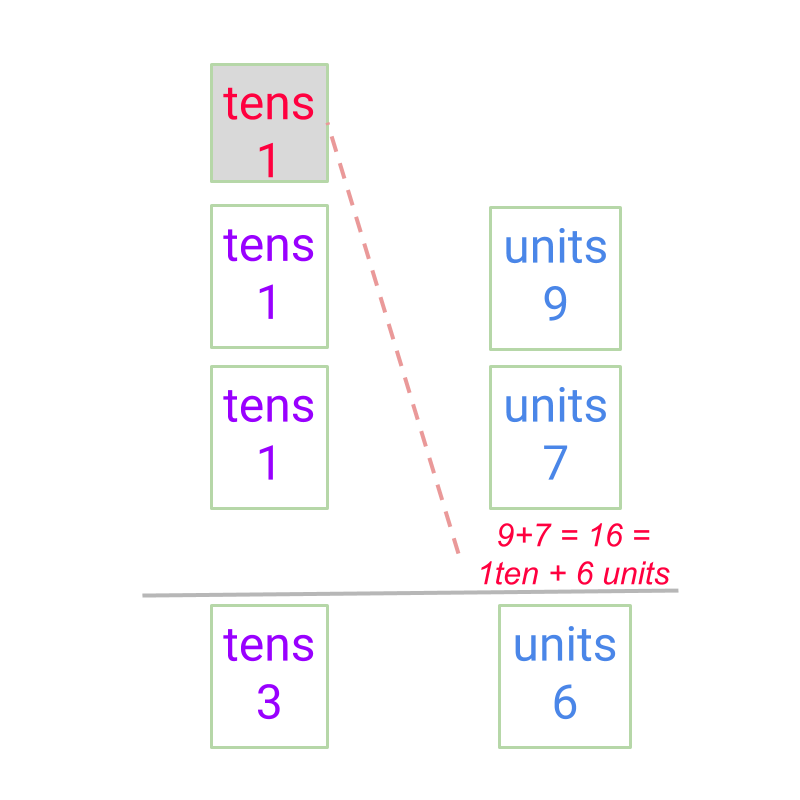
what you'll learn...
overview
The addition in first principles was explained as combining two quantities and counting or measuring the combined quantity.
For integers, the positive and negative numbers are to be handled appropriately. By considering all the combination of signs in addends, a simplified procedure is derived.
regrouping
In whole numbers, we had studied the following.
Addition by Place-value with regrouping -- simplified procedure : Two numbers are added as per the following procedure:
• the place-value positions are arranged units under units, s under s, etc.
• the units are added and if the result has numbers, then it is carried to the s place.
• The addition is continued to the higher place-value position.
 The carry over is the simplification of combining of a place value to a higher place value.
The carry over is the simplification of combining of a place value to a higher place value.
positive and negative
The terminology "received" and "given" symbolically refer to the positive and negative numbers of all applications.
For example, temperature above and below are referred as and respectively. The same in integers is and .
Integers are directed whole numbers.
is also referred as , meaning the magnitude given by the number is aligned to the chosen direction.
is also referred as , meaning the magnitude given by the number is opposed to the chosen direction.
For example, temperature above and below are referred as and respectively. The same in integers is and .
simplify
By first principles, and together is .
By first principles, and together is .
This addition is equivalent to whole number subtraction .
By first principles, and together is .
This addition is equivalent to whole number subtraction , with the result modified to the sign of larger absolute value.
By first principles, and together is .
This addition is equivalent to whole number addition , with result modified to the sign of the two addends.
Summary of integer addition illustrative examples:
• : To another is put-in
• : To another is put-in
• : To another is put-in
• : To another is put-in
• : To another is put-in
Based on this, the addition is simplified as
sign-property of addition
• +ve + +ve is whole number addition of absolute values
• +ve + -ve is subtraction as given below
absolute values of the two numbers are compared
subtract the number of smaller absolute value from the number of larger absolute value. The difference is the absolute value of the result.
the sign of result is the sign of the number with larger absolute value
• -ve + -ve The result is sum of absolute values with negative sign.
The addition or subtraction of absolute values in the procedure are detailed in addition by place-value and subtraction by place-value.
examples
Find the sum of and .
The answer is ""
Find the sum of and
The answer is ""
Find the sum of and
The answer is ""
Find the sum of and
The answer is ""
summary
Addition of Integers (Simplified Procedure) : Two numbers with signs positive or negative are added as follows.
sign-property of addition
• +ve +ve is whole number addition
• +ve -ve is subtraction as given below
absolute values of the two numbers are compared
subtract the number of smaller absolute value from the number of larger absolute value. The difference is the absolute value of the result.
the sign of result is the sign of the number with larger absolute value
• -ve -ve is addition of absolute values with negative sign.
The addition or subtraction of absolute values in the procedure are detailed in addition by place-value with regrouping and subtraction by place-value with de-grouping
Outline
The outline of material to learn integers is as follows.
Note: click here for detailed outline of Integers (directed numbers)
→ Introduction to Directed Numbers
→ Handling Direction
→ Ordinal Property
→ Sign and Absolute Value
→ Comparing Integers
→ Predecessor & Successor
→ Largest & Smallest
→ Ascending & Descending
→ Addition: First Principles
→ Addition: Simplified Procedure
→ Subtraction: First Principles
→ Subtraction: Simplified Procedure
→ Multiplication: First Principles
→ Multiplication: Simplified Procedure
→ Division: First Principles
→ Division: Simplfied Procedure
→ Numerical Expressions with Integers
→ PEMA / BOMA